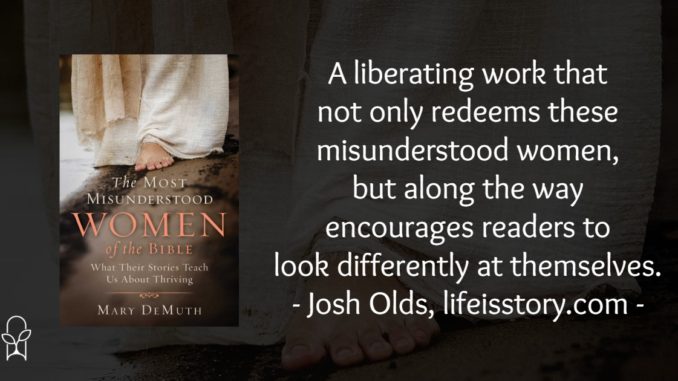
Published by Salem Books on April 12, 2022
Buy on Amazon
Goodreads

Understanding Isn’t Overrated.
Ask any woman—most of us know what it’s like to be misheard, mischaracterized, or misrepresented by family, friends, or strangers. Few of us feel deeply known and understood all the time. Worse, many of us have endured long, painful seasons of misunderstanding in which the people around us have questioned—or worse, judged—our motives and actions. We have asked ourselves, How do I correct these misperceptions? Do I try to defend myself—or does that only make me look guilty? How can I recover my joy even if someone believes something about me that isn’t true?
This problem—and your feelings and questions about it—is nothing new. In fact, women have faced it since the dawn of time. In this engaging book, Mary DeMuth tells the tales of ten women in the Bible who were misunderstood in their own time and often still are—bringing to each of them a deep humanity that makes her, and her problems, more relatable to twenty-first-century you. If you are struggling with feeling misunderstood, let these stories inspire you to grow and remind you that you are not alone. And remember: There is always One who understands you perfectly and stands ready to comfort, strengthen, and defend you through every situation you face.
The women of Scripture are often overlooked and, even when they are considered, what we’ve been told about them isn’t always correct. Eve is given the title of first sinner, the reason all of this (here I gesture vaguely out at everything) has happened. Leah is seen as jealous, rather than heartbroken. Bathsheba becomes a seductress rather than a victim of sexual abuse. Mary of Magdala is branded a prostitute. And the list could go on. Because of historical, patriarchal interpretations, the women of Scripture have often been robbed of their full dignity with their stories being maligned and manhandled to fit some misogynistic narrative.
In The Most Misunderstood Women of the Bible, Bible teacher Mary DeMuth seeks to realign our misaligned vision and show us who these women actually were. Mixing an imaginative fictional narrative with her non-fiction, DeMuth brings this corrected vision to life, helping readers actively work through what may be a brand-new perspective for them. Combined with just enough personal detail and anecdotes to make it conversational, rather than academic, The Most Misunderstood Women of the Bible is an eye-opening, perspective-shifting, thoughtful, compassionate, and liberating exploration of Scripture.
Each chapter ends with discussion questions that fit the topic, leading readers toward even deeper thinking and exploration of the woman in that chapter. While this is great for individual use, I imagine it being used even more effectively as a group Bible study. DeMuth’s personal, contemporary applications are timely and important. Women will see themselves reflected in these historical figures in positive ways, in ways that lead to healing and redemption.
The ten figures The Most Misunderstood Women of the Bible discusses are:
- Eve: The Blamed One
- Hagar: The Forgotten One
- Leah: The Unlovely One
- Rahab: The Prostituted One
- Naomi: The Grieved One
- Bathsheba: The Harmed One
- Tamar: The Violated One
- The Proverbs 31 Woman: The Perfect One
- Mary of Magdala: The Demonized One
- Phoebe: The Unknown One
While each and every one of these chapters are powerful in their own right, there were a few that stood out to me as exceptionally important. First, the opening chapter on Eve dispels the narrative that burdens her with all of the blame for the Fall. “The serpent deceived me and I ate” has often been seen as Eve passing along the blame, but, as DeMuth notes, Eve is stating the exact truth. She admits to eating. She places blame on the true villain. Adam, on the other hand, blames both God and woman. The church shifts the blame away from God, but has seemed intent on leaving the blame on women. DeMuth uses this to springboard into a conversation about dealing with being misunderstood and being accused of something you didn’t do, or of something you didn’t intend to do.
The second thing that stood out was DeMuth’s unequivocal and firm portrayal of Bathsheba as the victim of sexual abuse. This is so important, particularly in light of the crisis of sexual abuse that has come to light within churches of almost all denominations. The portrayal of Bathsheba as an adulteress or seductress is ensconced in evangelical (and Reformed, particularly) theology. I’ve even seen this viewpoint promoted by popular female Bible teachers. But this view does not take into account the power differential between David and Bathsheba. DeMuth, with clarity and compassion, presents Bathsheba as a victim of abuse. This chapter could be the catalyst for healing for so many that feel guilt or have been shamed because they were abused.
The third is the chapter on the Proverbs 31 woman. As a pastor, I cannot stand this passage of Scripture—at least not how I’ve seen it misappropriated through cutesy Mother’s Day sermons and retrofitted to fall within modern cultural expectations. When interpreted like this, it presents an impossible standard that can leave women feeling like they are constantly coming up short. DeMuth’s capable exegesis infuses grace into the works-filled passage and encourages readers to not compare themselves against a poetic wonder-woman.
The Most Misunderstood Women of the Bible is a liberating work that not only redeems these misunderstood women, but along the way encourages readers to look differently at themselves. Representation is important and women need to see themselves reflected in Scripture. Too often, that reflection has been obscured through superficial and patriarchal interpretations. Mary DeMuth brings both compassion and clarity, offering a new (but really, old) vision of who these women were—and by extension, what you can be.
